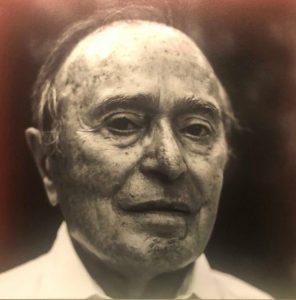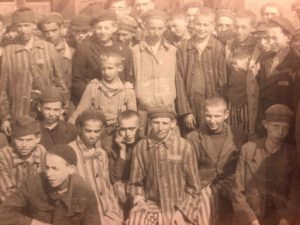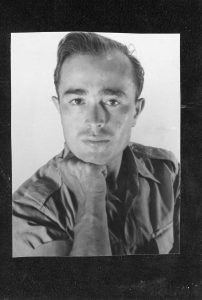Holocaust Survivor Story: Sam Gross
The Florida Holocaust Museum’s mission is to honor the memory of millions of innocent men, women and children who suffered or died in the Holocaust. The Museum is dedicated to teaching the members of all races and cultures the inherent worth and dignity of human life in order to prevent future genocides. In order to accomplish this mission, The FHM tells the stories of local Holocaust survivors. The FHM sat down with Holocaust Survivors and their families, collecting original documents, objects and photographs, while listening to their stories.

While each man, woman and child who survived the Holocaust experienced incomprehensible loss and different degrees of suffering, each account is different. Some Holocaust survivors were interned in concentration camps, while others escaped just in time. There are those who hid in plain sight with false identities and others who fought back. Each story is unique. Each story is valuable and should be remembered and shared.
One story is of Sam Gross (1926-2004). Sam was forced to live in a ghetto and then deported to Auschwitz, where he endured horrific conditions as a slave laborer and prisoner.
Sam was born in 1926, in Palanok, Czechoslovakia, a suburb of Munkacs. In 1939, Sam’s pleasant life was turned upside down when their region was seized by Hungary and antisemitic legislation was introduced. Food was rationed and many men, including three of Sam’s brothers, were forced into slave labor for the Hungarian military on the Russian front. In 1944, Hungary was occupied by the Nazis.
On the first night of Passover, Sam and his family sat down to Seder, until a family friend knocked on their door to warn them about German soldiers who he heard discussing a roundup of Jewish citizens the following day. Unfortunately, their friend was right. The next day, his and other Jewish families were forced to assemble in the street. They were marched towards a newly created ghetto. After spending some time in the ghetto, deportations to Auschwitz began. Sam and his remaining family (three brothers were still working on the Russian front) were deported by box car.

Once they arrived at Auschwitz, Sam was separated from his family, shaved, forced into a delousing bath and issued a prisoner uniform, and was selected for work. Every day, Sam and the other prisoners would travel two miles to get to work where they would they load and unload freight trains.
In January 1945, Sam was sent to Buchenwald. Thankfully, he was reunited with two of his brothers. When the Nazis began to liquidate the camp, he was left behind by laying on top of dead bodies as though he was dead. On April 11, 1945, American Forces arrived at the camp liberating more than 21,000 people still there.
After liberation, Sam returned to Munkacs but decided not to say. He traveled to London, where his siblings were living. In 1947, he made the decision to go to Palestine to fight for Israel’s independence.

In 1954, Sam traveled from Israel to the United States to be the best man in his brother’s wedding. Unfortunately, by the time he arrived, the engagement had been called off. Instead of returning to Israel, Sam decided to stay in the U.S. in Youngstown, Ohio to work with his brother in his pre-cut home business. The business was very successful! They had offices in 16 states.
Sam met his wife Alyce at the community Jewish center in 1960. They got married on October 28, 1962. In 1982, Sam, Alyce and their children moved to Tampa, where he started a new real estate venture, The Roal Group.
Sam was a true humanitarian. He served on the boards of United Way, Congregation Schaarai Zedek, and Tampa Jewish Federation. Sam Gross was a founding board member of The Florida Holocaust Museum and assisted in the fundraising for The FHM. He was also a member of The Museum’s speaker’s bureau and spoke to many schools and community groups. He was awarded the “Points of Light” award by Governor Jeb Bush in 2004.
Sam Gross passed away in 2004. Sam’s story is one of resilience and faith. It is essential that his story, along with other Holocaust survivors, is told to generations to come to ensure Holocaust remembrance. Telling the stories of Holocaust survivors is essential today. We have an obligation to ensure hatred never causes such an atrocity ever again.
To learn more about Holocaust survivors who greatly impacted the Tampa Bay community, visit The Florida Holocaust Museum. Go to the third floor to view, Stories of Survival: The Florida Holocaust Museum Remembers: https://www.thefhm.org/exhibits/stories-of-survival/.
